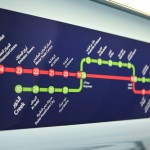By Shafaat Ahmed www.khaleejtimes.com
Acting upon the feedback of its customers and studies by its planning team, RTA has wrung in comprehensive changes to its feeder services just as it is doing with its standard bus networks.
 The feeder buses which transport people to and from Dubai Metro stations across the city have been the key component behind the success of the metro as it is a free service for train passengers.
The feeder buses which transport people to and from Dubai Metro stations across the city have been the key component behind the success of the metro as it is a free service for train passengers.
As many as 107 feeder buses transport one million passengers on nearly fifty routes every month. The figure is phenomenal compared to the early days of metro when only 20,000 people used the services.
Despite the obvious success, there are a few hitches here and there and some frequency and punctuality issues in certain busy areas during peak hours. Jafza-Ibn Batuta is one such route which is very busy during peak hours and a lot of people are facing difficulties in reaching their destinations in time.
Ganesh Nair, who uses the feeder service from Ibn Batuta metro station to Jafza frequently, says he has to wait in long queues both during morning and evening peak hours to board the feeder bus.
“After the direct routes from Deira and Bur Dubai to Jafza were cancelled recently, this is the only choice we have. I sometimes reach office late due to long queues at Ibn Batuta station during peak hours,” said Nair, referring to the cancellation of popular routes 90, 91, 91a, 28x to Jebel Ali.
“On a few occasions, I paid for feeder services as I couldn’t board a bus within the stipulated half hour after getting down from metro due to heavy rush,” added Nair, who works for a food processing company at the Jebel Ali Free Zone.
Reacting promptly to such feedbacks from people, the PTA has made a few changes to the feeder routes F50, F52 and F53 that run between Ibn Batuta and Jafza along with some other high demand feeder routes.
“We are adding more buses to these routes as well as replacing standard buses which currently ply on these routes with articulated ones to accommodate more passengers,” Mohammed Abu Baker Al Hashemi, Acting CEO of PTA, told Khaleej Times.
He also said along with more buses, the frequency has also been increased from 20 minutes to 10 minutes.
Apart from the Ibn Batuta routes, several other key routes have also been tweaked to accommodate more areas and add more stops, while the number of buses as well as frequencies have been reduced on some less popular routes. Route F10 will now accommodate Al Warqa area as well and the frequency on the route will be reduced due to less demand, where as F11 will also cover Al Bada’a where so far there was no feeder service.
More stops are being added on Route F30, while Route F31 which runs between Mall of Emirates and the Meadows will also have additional stops.
“We are adding more stops to certain routes after receiving a lot of requests from the people. It will be easier for commuters now, especially in this hot weather, as they will have to walk less to reach a stop,” said Al Hashemi as he divulged details of changes being made on different routes.
Extra stops could also be seen on Route F32, which serves people around Dubai Marina and Dubai Internet City.
These changes along with deployment of more articulated buses on popular routes and reducing the number of buses on some less popular routes would come into effect on July 1.
Farhad Hakim, another regular commuter on routes F52 and F53 said that “the additional buses and stops would be a boon for passengers as they would reduce the waiting time in the heat, which is really tiresome. We appreciate RTA’s efforts in acting upon our requests so quickly.”
Feeder routes F15, F25A, F46, F3, F4, F5, F10, F11, F29, F30, F31 and F33 along with F50, F52 and F53 would be affected from July 1.
















